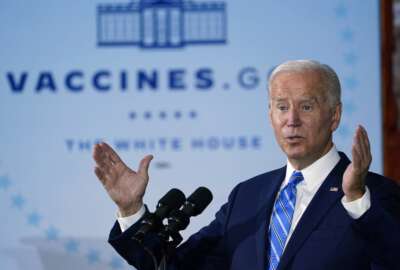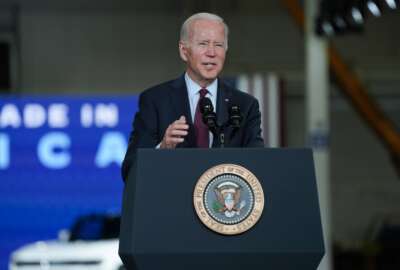Biden’s management agenda: New sneakers or retread?
The Federal Drive with Tom Temin got one view from the President and CEO of the National Academy of Public Administration Terry Gerton.
Best listening experience is on Chrome, Firefox or Safari. Subscribe to Federal Drive’s daily audio interviews on Apple Podcasts or PodcastOne.
The Biden administration’s management agenda, which it called a “vision,” laid out three basic principles: Boosting the federal workforce, improving citizen service and using the bureaucracy to achieve the administration’s agenda. New stuff, or old wine in a new bottle? The Federal Drive with Tom Temin got one view from the President and CEO of the National Academy of Public Administration Terry Gerton.
Interview transcript:
Tom Temin: Terry, good to have you on.
Terry Gerton: Hi, Tom. Happy to be here. Thanks so much.
Tom Temin: So what is your reaction? This was called a vision for the president’s management agenda. Is it a vision for an agenda? Or is it a vision for management, do you think?
Terry Gerton: Well, that’s a great question. I will say,when I read it through the first time, it felt like I was walking into a concert where everybody was playing my favorite tunes in a key I could sing. There’s a lot of words in here that so closely aligned for how they want government to operate – the proof, as always, will be in the pudding.
Tom Temin: Well, this was simpler than some of the earlier management agendas. And it didn’t go into a lot of detail. It had strategies, a couple of strategies under each of the main points. But those were not really detailed things for the bureaucracy to get going and do now. Does that seem to be in keeping with most past presidential management agendas are those came out later in administrations with more detail?
Terry Gerton: Right, I think, as I understand it, their plan is to share more of the specific performance management goals when they roll out the 2023 budget, and along with those the performance metrics that they’re going to track. So that’s pretty consistent. About the first year in with the first submission of the budget, you get that much more detail. This is a little bit unusual in terms of sort of laying out the roadmap up front, saying this is how we’re going to go forward. And we’re following up with the particulars later. But I think this does a nice job of, as we talked before, being consistent with many of the things that previous administrations have done, so that there’s continuity, because trying to turn the federal government ship, is not a one-term project. You need to be continuing to work over years and sometimes decades to make sure that you make those changes. So I think that there is some good there around continuity, especially in some of the basic management processes.
Tom Temin: For those in federal management, managers and senior executives, there is a repeated and strong emphasis on the right to join a union, almost as if they’re encouraging anyone who’s already not in a union in the federal government – well go ahead and join one. Should managers feel that that’s speaking to them? Or what’s your sense of how that’s gonna go?
Terry Gerton: Well, I think the Biden administration has been really clear that they support every individual’s right to participate in the union. But from a federal managers perspective, I think what’s far more important is the broader context that they set for that, which is that they want the federal workplace to be a model employer. And that means that people have good jobs, meaningful jobs, that they’re treated with respect that they have the technology that they need to get their work done. And then along with that, they suggest the opportunity to participate in union activity. So I think of it as a much broader agenda for the federal workforce. We start to see them moving out in that direction already, modifying telework policies and those kinds of things. So if I was a federal manager today, I would take the broader look at what this conveys about their goals for the federal workforce.
Tom Temin: Because with respect to the union movement in general, I mean, the statutory role of the federal government has been to be a referee between either federal agencies and unions or companies and unions and not to take sides. And so they shouldn’t be anti-union, but they shouldn’t be pro union, they should be pro – “it’s up to you guys.” So do you think this mitigates a little bit too far to one way?
Terry Gerton: Well, again, this is clearly trying to address the swing in the pendulum of the previous administration that went all the way to the other side. So I suspect that it will settle kind of in the middle and managers should be permissive. They need to provide the support that’s required in law. But again, the whole goal of this and I think it really gets to the values that are communicated in the vision here treating people with dignity, looking for equity in outcomes. Those are really key principles that should allow managers to better construct their workplace.
Tom Temin: We’re speaking with Terry Gerton, president and CEO of the National Academy of Public Administration. There’s also emphasis on the Office of Personnel Management, which for better or for worse, was kind of battered up during the Trump administration and is trying to regain footing as what should its role be permanently here in the federal workforce. So would you say that’s an encouraging sign to see OPM the subject of a rebuild?
Terry Gerton: Well, absolutely, of course, Tom. You and I have talked in the past about the Academy’s recent report on how to rebuild OPM. So this idea that their very first priority is on rebuilding the federal workforce, what that means in terms of modernized recruiting and retention and training and talent development. Those are all exactly the things that we’ve been hoping to see his actions that would come out of our recommendations. And as we’ve said all along, this is an ambitious agenda. You can’t accomplish it if you don’t have the right people in the right seats. And so OPM has to be a central player in anything this administration is going to do because if they can’t get the right people on board, then the rest of the agenda, as ambitious as it is, is sort of just pie in the sky.
Tom Temin: And one other thing I wanted to ask you about in there is the emphasis on training and development of people at all levels of the government. And as you know, the training is often a budget item that’s the first to go when times get tight. So I guess it’s encouraging. And you can tell me if you agree that there is that emphasis on development of people, because none of this can happen without making sure people know how to be good at what they do and how to manage.
Terry Gerton: That will be a key test of how this goes forward is to see in the FY 2023 budget when they submit it, what resources are allocated to that kind of training and development, how they make the case for continued leadership development – for example, training of new managers, and whether then the request stays in the budget all the way through appropriation. And that will be true for many of the other recommendations or directions, I guess, would be appropriate in this document is we see what the words say and are encouraged by them. Now, we want to make sure that there are actually resources available to accomplish them. Because many of these are, if not substantial changes, at least extensions and expansions of projects that are sort of already underway. And so making sure that there are the resources shows the commitment to make sure that they actually make progress on this vision.
Tom Temin: And of course, every administration wants to improve service to the “citizen” I think was the term used originally, that was a movement that started I think, in the late ’80s at this point. And now we have customer experience and all of those things. And there’s a lot of emphasis on that point, too, the central pillar of the whole thing is serving citizens better. Your reaction there?
Terry Gerton: Well, I think it’s absolutely key. I mean, one of the things that we have seen in spades throughout the pandemic is that people need to be able to interact with their government in a much more efficient and effective way. And one of the things that the academy is learning through our work on agile government is that the effectiveness of that citizen experience has a lot to do with how much those people then trust their government and deliver results. So I think there’s some really interesting points in here about imagining lifecycle points and how you don’t just deal with a single federal agency, but how is your experience across all of those and an example is turning 65 and having to file for Social Security. You have to deal with several federal agencies. And yet each one of them is a different and unique set of contact points, a set of data that you have to provide. So this idea that you could think about lifecycle points where people have to interact with the government, and what that looks like and feels like and do it from the citizen’s perspective has the potential to really dramatically change how government approaches certainly at the federal level – data sharing security, privacy and integration of systems. So really excited to see this focus. And it’s very much in line with things that the Academy has been talking about for quite a while.
Tom Temin: And one final question on the issue of accountability: It does mention accountability in that pillar. Yet, if you look at the Trump administration’s management agenda, it was all about, without stating it directly, in these words, getting rid of the poor performers as fast as possible. This takes the opposite approach to elevating civil servants and civil service. Do you think that maybe there should be a balance there between, “Yes, we want to make your job great. But yes, you got to perform or you won’t be here?”
Terry Gerton: I take a slightly different perspective on the accountability question here, which is I think they want the administration to be held accountable for the changes that it’s promising. And that can only happen in a world where they really make progress on data sharing, performance measurement, integration of systems, performance reporting. And so I think they are very intentional about being held accountable by citizens for this agenda. And to do that, they’re going to have to put all of the pieces and processes in place that allow people to see the data to believe that data and then to take appropriate action to make sure that the administration is delivering on what it’s promised.
Tom Temin: I guess then the next thing to look at was a lot of interest will be the new Federal Employee Viewpoint scores.
Terry Gerton: Well, that will be key. And it will be interesting to see how they follow from last year’s when they kind of went up as people were enjoying and appreciating the opportunity to work remotely. But I think there’s also another piece that’s really important in this vision, and that is the “how we’ll get there” section – where it talks about some of the things we were just mentioning, right? A focus on data management and data integration, a focus on systems that better serve the citizens. So it actually lays out some things that hint at next steps and the engagement of the President’s Management Council. All of the major agency, deputy secretaries have signed on to this. And that’s something we haven’t seen before. So they are laying out a plan. They’re showing a little bit of their cards about how they plan to go forward. And so now I think, it’s up to all of us to watch that to make sure that we see evidence of real progress, and then that we track the metrics and make sure that improve performance is the result.
Tom Temin: Terry Gerton is president and CEO of the National Academy of Public Administration. As always great to have you on.
Terry Gerton: Tom, always a pleasure to be here. Thank you.
Copyright © 2025 Federal News Network. All rights reserved. This website is not intended for users located within the European Economic Area.
Tom Temin is host of the Federal Drive and has been providing insight on federal technology and management issues for more than 30 years.
Follow @tteminWFED






